- Home
- Courtney Milan
Unveiled Page 16
Unveiled Read online
Page 16
Margaret shook her head. “Aren’t you worried?”
“Worried?” Ash’s eyebrows rose in confusion. “Ought I be? About what?”
“About…” Margaret spread her arms wide. “You know. Women. You’re wealthy. You’re young. You’re handsome, and if…if matters go your way, the two of you will be in line to inherit one of the most respected titles in all of England. Aren’t you worried that some scheming chit will trap you into matrimony?”
Ash and Mark both looked up at her, their expressions mirror reflections of concern.
Then Ash shook his head. “You have the strangest ideas in your head. In your experience, how many women are there who are intelligent enough to scheme me or my brother into matrimony, but also foolish enough to force a marriage with a man who doesn’t wish to have her?”
Margaret simply stared at him. “I don’t—that is to say—”
“Precisely. I’m not opposed to matrimony, should I find myself in love.” His eyes met hers, and she felt her toes curl.
He couldn’t mean her. He couldn’t possibly mean her. She was a servant, a nurse, a bastard. Dukes didn’t marry bastards. But then, Ash had always stood outside of her experience altogether. And she didn’t know what he intended. Not any longer.
The concept was so foreign to her—the notion of a man marrying without being bullied into it—that she could say no more. By the way he was looking at her, he no doubt remembered their conversation on this score. Her fiancé. The dreadful shame she had felt.
“Miss Lowell.” His voice was quiet. “I have no idea where you received your notions. No doubt you’ll tell me it’s no business of mine. But I find there is something I should—no, I must—say to you.” He paused and ran his tongue over his lips. “If a man ever lets you know that he sees marriage as a trap, and women as nothing but scheming connivers, you are by no means to marry him. Any man that sees your entire sex in so harsh a light has nothing to offer you.”
Put that way… Her emotions swung towards him, the needle on a compass pointing northward. Hope and despair collided within her, all twining into that word.
Marriage.
Frederick could never have thought much of her, or he’d never have used her as he did. She was better off without any of the men who had paid her court and then turned their backs on her when she was announced a bastard. There was only one man who’d looked at her and seen something worth seeing. But no. She couldn’t think of marrying him, either. Once he discovered who she was, he would despise her.
“But—” she began to say.
He chopped his hand down, as if to end all further inquiry. “But nothing. Either it’s an honor to marry a woman, or it’s not to be done at all, not at any cost.”
But I was born Anna Margaret Dalrymple. One sentence, one admission, and all the weight of his ruthlessness would come to bear on her. He’d stopped being her enemy, but she was still his. And suddenly, she couldn’t stand the thought that the easy regard reflected in his eyes might dim.
“You’re not a pair of steel jaws and a strong spring, waiting to bite through a man’s boot if he steps wrongly.”
And why should a ridiculous compliment make her want to burst into tears? Perhaps it was the sweetness of it. Perhaps it was because, for all of Ash’s apparent traveled worldliness, there was a golden innocence about him, something clear and untainted by bitter vinegar. This was the man who laughed with the housekeeper and shrugged when his brother taught the nurse how to spar.
Instead, she looked away. Mark was watching them, his eyes narrowed. If Ash had a worldly innocence about him, Mark seemed filled with an almost impudent purity—playful when he noticed you, distracted when he was too busy thinking of his own work. But he wasn’t distracted now. He focused on her, as if he were suddenly seeing something new in her face.
“By the way, Margaret,” Ash said, his voice pitched too low for Mark to hear. “I thought of you while I was gone.”
She couldn’t help herself. She looked back at him. He smiled when she caught his eyes. His gaze seemed warm. Almost—no, she could not say it, but she couldn’t avoid it either—almost loving.
She wanted him to look at her like that forever.
But he wouldn’t. In a few days—perhaps in as little as a few hours—this would all come to an end. She would tell Ash the truth of her identity. And once he knew, he would never again tell her that she wasn’t a conniving schemer, that she wasn’t a trap to snap about a man’s foot.
This couldn’t go on.
“Did you find what you were looking for in London?” Margaret asked.
He watched her, his eyes intense. He seemed to look right through her skin, into the heart of her. And then he gave a quiet, put-upon sigh. “Almost,” he said. “Almost, which is the same thing as not at all. I’ll let you know when it arrives.”
MARGARET CAME TO HIS OFFICE as twilight fell—an action that both heartened and frustrated Ash, all at once. He had hoped that by the time he saw her again, he would have in hand what he had set out to obtain. But bureaucracy being what it was—and Ash being, at present, only a third-rate claimant to a dukedom—he’d managed only to extract a promise to have what he wanted sent on, once it arrived. It irked him that something so straightforward was taking so long.
He wanted to claim her now.
And so instead of waiting for her to come alone to his office that evening, where he would undoubtedly be tempted to break his word, he’d asked Mark to come sit with him.
She smiled as she entered, her eyes settling on Ash and Ash alone.
And then: “Good evening, Miss Lowell.” Margaret started visibly at Mark’s words, and turned to where he sat. It made Ash feel that he had somehow betrayed her by conspiring to keep her virtue.
He gestured to a chair. “Sit,” he commanded.
She glanced at him—no doubt wondering why he was barking orders at her—and sat. He wasn’t quite sure what it meant that she didn’t take the seat he’d gestured to, an embroidered chair, but instead sat on the low-backed sofa where he’d kissed her the other night. There was room on there for him to sit, room for him to slide next to her, his thighs touching hers… He could still send Mark away.
He shook his head, but while he could banish that image from his mind, he could not dispel the faintly floral scent that had swept into the room with her.
“Ash was telling me,” Mark said, “about how he got Lord Talton to agree to take his side in the upcoming battle in Parliament. You do know about the pending legislation, don’t you?”
Her jaw set. Ash could not guess whether that was because of Mark’s assumption that she might not know what must have been basic household gossip, or because even now she still held some unfortunate loyalty to the Dalrymples. She gave a jerky nod, though, and Mark continued.
“Well, Talton had refused to even see him, and—”
Ash held up his hand. “Miss Lowell doesn’t want to hear about my ruthlessness.” He emphasized that last word.
Margaret looked down, her hands clasped together in a tight grip. “I suppose you found a way to charm him,” she said. There was a hint of bitterness as she spoke. Was she annoyed with him for leaving her without saying his goodbyes, or for disrupting their renewed acquaintance with Mark as a chaperone? He needed to speak with her alone to find out.
And no sooner had he thought that, than thoughts of what he would do with her when he found her alone intruded. Last time he’d had her here, he’d had her skirts to her waist, and his hand between her thighs.
God. He was a lustful idiot.
“You know,” Margaret said, cutting into his reverie, “I don’t think you’re ruthless at all. I think it’s a sham. You pretend at it quite well, but what harsh thing have you ever done?”
“You’ve never seen me crossed,” Ash said softly.
Mark made a sour sound. “You’ve never seen me crossed,” he said. “Smite said once—”
But his brother shut his mouth and glanced across the
table, as if thinking better of completing that sentence. That abrupt stop felt like a fist to Ash’s throat. He’d never been able to read his other brother, and Smite was closemouthed on all things.
Ash sometimes suspected that Smite held him in acute dislike. He had every reason to do so.
“What did Smite say?” Ash choked those words out past the ache in his gut.
“Smite said you were our personal avenging angel.” Mark dropped his eyes guiltily.
Well. It could have been worse. It could have been a lot worse. “That’s true.” He met Margaret’s gaze and wagged a finger at her. “Cross my brothers, and I’ll salt the earth under your feet. I’ll raze your defenses and reduce everything you love to rubble. There. Now you’ve been warned.”
She smiled. There was a touch of unease to that tentative curl of her lips.
“Oh, you think he’s joking?” Mark said. “You cannot have forgotten, Miss Lowell, the circumstances that brought us here. This—” he waved his hands expansively at the room around them “—this is Ash’s revenge on the Dalrymples.”
Margaret’s face shuttered. There was no other word for the pallor that crept across her skin, the sensation that she had just slammed the storm windows shut in preparation for a great gale. Her body drew subtly in on itself. “Oh?” That single word wasn’t a query, but another line of defense.
But Mark didn’t understand that. Likely, Mark hadn’t spent time studying the moods that crept across her face. He didn’t understand her vulnerabilities. He didn’t understand that she was still a wild creature, a little hesitant to eat from his hand. Ash cast Margaret an apologetic glance, but she wasn’t looking his way.
Mark leaned forwards. “He can’t forget some small slight, delivered years ago. One that was met with more than sufficient punishment at the time. He saw the opportunity to bring the Dalrymples down—”
She would think Ash was the most capricious fellow ever if Mark continued to tell the story in that way. “You call that some small slight? Miss Lowell, judge the truth for yourself. My brother sent me a note when he was six months at Eton, begging me to take him home. Naturally—” Ash heard the scorn in his own voice “—I undertook to ride out to see him. Not to take him home—I was determined that he would have the education that I did not.”
She nodded, understanding what Mark did not know.
“As I recall,” Mark put in, “you read me the most astonishing lecture on my duty to my name and my person. Afterwards, I was too frightened to even so much as suggest leaving.”
“You see,” Ash said, “he’d suffered a thousand indignities from the older boys—shoves when nobody was looking, little cruelties and taunts delivered in lonely halls. He was small for his age, then, and quiet.”
She watched him, her hands clasped in a white-knuckled grip.
“And he was a Turner,” Ash continued. “It wasn’t enough that Parford let my sister die. Edmund wanted everyone to know that no matter what the bloodlines proclaimed, Mark counted as no kin of his.”
She cast her eyes down to the carpet. Her jaw set.
Ash smiled grimly. “My brother begged me to let him come home. I refused and told him that under no circumstances would I allow him to do so. I walked away from him.”
“As you should have,” Mark commented.
“A few weeks later, I had this notion I should go back.” It had been another one of his instincts, and it had practically screamed for him to return. “When I got there… I have never been so furious in my life.” He could feel his fury returning, just thinking of it. “They broke his nose. They blacked his eyes. Three fingers on his right hand—”
“But,” Mark put in quietly, “you didn’t see the other boys.”
“Ah, yes. The other boys. Edmund Dalrymple and four of his friends had taken him on together.”
Margaret looked at him in shocked dismay. She shook her head. “It couldn’t have been. Together? But—”
“Don’t tell me what could have been. It was, in violation of all gentlemanly conduct. Apparently, they had been trying to bully him. And apparently, he hadn’t given in.”
“This happened years ago,” Mark put in. “I see no reason to think of it. But has Ash forgotten?”
“Have they let me forget? There’ve been no physical attacks since then. But tell us truly, Mark. Has Edmund ever forgotten you? And Smite—Richard was never so uncouth as to attack, but I know why Smite moved to Bristol, instead of taking articles in London as we had once discussed.”
Mark shook his head earnestly. “Really, Ash. It doesn’t bother me—why must you take it so seriously? I try not to spare either of them my attention. I’ve better things to spend my time worrying about.”
Ash looked up. “They have spread rumors. Innuendo. Edmund once hired a caricaturist to portray Mark as a—”
“Ash, really.”
But his brother’s admonition only heightened Ash’s resolve. “For years, they used their station and their place in society as a way to humiliate my brothers. So, yes. I’ll take their station. I’ll take their place in society. And I’ll have no mercy whatsoever for the Dalrymples. If I can make their lives miserable in response, I will. And…” Ash felt a wolfish smile play across his face. “I can.”
Margaret stared at him, white-faced.
“Don’t tell me you agree with Mark,” he said in surprise. “Turn the other cheek, and all that nonsense. If someone threatens me and my own, I won’t rest until he’s been taught to leave well enough alone.”
“But what…” She stopped, looking down, and then looked up at him, her eyes filled with inexplicable entreaty. “What about the innocents who are hurt by your actions?”
“What innocents?” He spat the word.
Her eyes fluttered down again. “The duchess.”
“That…that was unfortunate. In truth, if it had come to it, if she’d survived… I don’t want true innocents to suffer. Hell, I’d make some provision for the Dalrymples. I would certainly have done something for her.”
“If you had thought about it,” Mark put in gently.
Margaret’s lips were almost white. “And what about Parford’s daughter?”
“Parford’s daughter.” Ash shook his head in confusion. Then he realized she must have known the woman, conversed with her during the course of the duchess’s illness. “Wasn’t she married off earlier? I seem to recall hearing about an engagement, years ago. I don’t keep abreast of such matters. I suppose she must have suffered some embarrassment, then. But I also suppose she was used to the feeling. Wasn’t she the girl who fainted in the fountain, her first year out?”
A flush touched Margaret’s cheeks. “I find it quite odd that you can be so kind to mere servants, and yet so cavalier to everyone else. Had you simply not thought of how your actions would affect everyone connected with the Dalrymples?”
“What does it matter?” he asked in bewilderment. “She married some other fellow. She’s well and truly out of it.”
“No. I don’t believe she married.”
Ash snorted. “Let me guess. She fainted before she said ‘I do.’”
Margaret didn’t smile. Ash had the feeling that he’d fallen into a world where down had become up and right had turned into left. “Oh, come now. That was at least a little clever. Whatever her name might be— Anna, is it?”
He should have known, but then, how was he to discover such things? Consult Debrett’s?
He took a deep breath. “I’m sure she is a perfectly acceptable specimen of a lady, if you like such things. But you must admit, she must be a poor creature to topple over so easily. If she did not do it to draw attention to herself.”
Margaret met his gaze for the first time that evening. It was then he realized what lay behind her unease—a cold, inexplicable fury. “Let me guess,” she said. “You have never worn a corset and a ball gown for seven hours.”
He grinned casually. “Now there’s a daring wager. Even if I did, I shouldn’t lace them so
tightly as to squeeze out my breath, no matter what the occasion. If someone is such a slave to fashion—”
“It’s not merely the lacing. Ball gowns aren’t laced as tightly as some other dresses; you need to allow more room for movement. It’s the heat. And the layers. Do you know how a ball gown is assembled?”
This was what happened when he used his brother as a shield. He ought to have met her alone and convinced her to take port with him. Now, instead of getting pleasantly drunk and snuggly, Miss Lowell was lecturing him on the construction of ball gowns. He must have lost his mind. He’d certainly lost his touch.
“Yes,” he said in a dry tone of voice. “I know how ball gowns are made. They are made of fabric.”
She snorted. “And?”
“Thread? Ribbons? Buttons?”
She simply looked at him, one eyebrow raised.
“Whalebone? Metal? No, wait—now I see. They are composed of lead, and are purposely made heavy, to force women to walk in a slow and elegant fashion.”
She still didn’t laugh. “They are sewn in place. That means there is no way to remove one once the ball has begun. Once it is on, it stays on for the entire evening. Think about what that means. One cannot simply relieve oneself at the drop of one’s breeches. One cannot, in fact, use the necessary at all. So before a ball, ladies do not drink or eat anything. Not for hours. During a ball, one can only wet one’s lips.”
He glanced at her. “Really?”
Somehow, that tone of disbelief made her blush, too. “Indeed. I’ve heard the maids talk about it. Eight hours on an empty stomach, whirling about, clad in seven petticoats. You would topple over, too.”
“I had no idea society ballrooms were so barbarous.” He said it with a smile, but still Margaret didn’t return the expression.
“No doubt,” she said with a lift of her chin, “you would think me a poor creature, too, if you swathed me up in layers of silk and withheld all water, just to see what would happen. I daresay I wouldn’t last the evening. Think, Mr. Turner, before you speak. If you rely on rumor, you will never understand.”

 Her Every Wish
Her Every Wish Midnight Scandals
Midnight Scandals After the Wedding
After the Wedding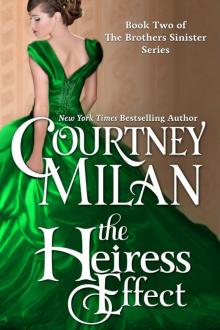 The Heiress Effect
The Heiress Effect Unraveled
Unraveled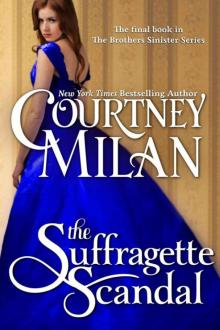 The Suffragette Scandal
The Suffragette Scandal The Year of the Crocodile
The Year of the Crocodile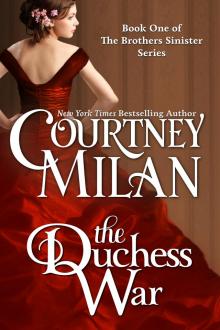 The Duchess War
The Duchess War What Happened at Midnight
What Happened at Midnight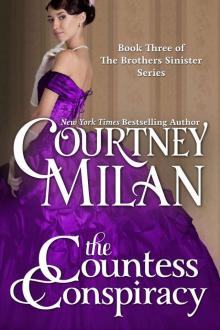 The Countess Conspiracy
The Countess Conspiracy Proof by Seduction
Proof by Seduction Unlocked
Unlocked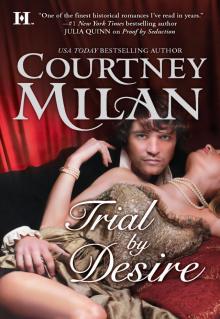 Trial by Desire
Trial by Desire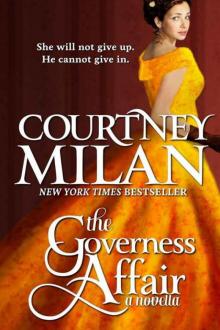 The Governess Affair
The Governess Affair Unveiled
Unveiled The Lady Always Wins
The Lady Always Wins Trade Me
Trade Me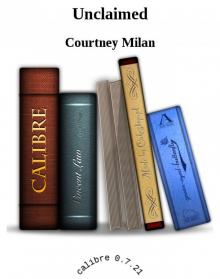 Unclaimed
Unclaimed This Wicked Gift
This Wicked Gift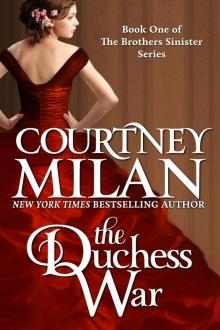 The Duchess War (The Brothers Sinister)
The Duchess War (The Brothers Sinister) Hamilton's Battalion: A Trio of Romances
Hamilton's Battalion: A Trio of Romances The Turner Series
The Turner Series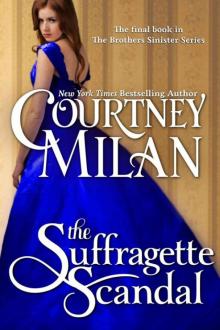 The Suffragette Scandal (The Brothers Sinister)
The Suffragette Scandal (The Brothers Sinister) Seductive Starts
Seductive Starts The Pursuit Of…
The Pursuit Of… Hamilton's Battalion
Hamilton's Battalion The Carhart Series
The Carhart Series Seven Wicked Nights
Seven Wicked Nights This Wicked Gift (A Carhart Series Novella)
This Wicked Gift (A Carhart Series Novella)